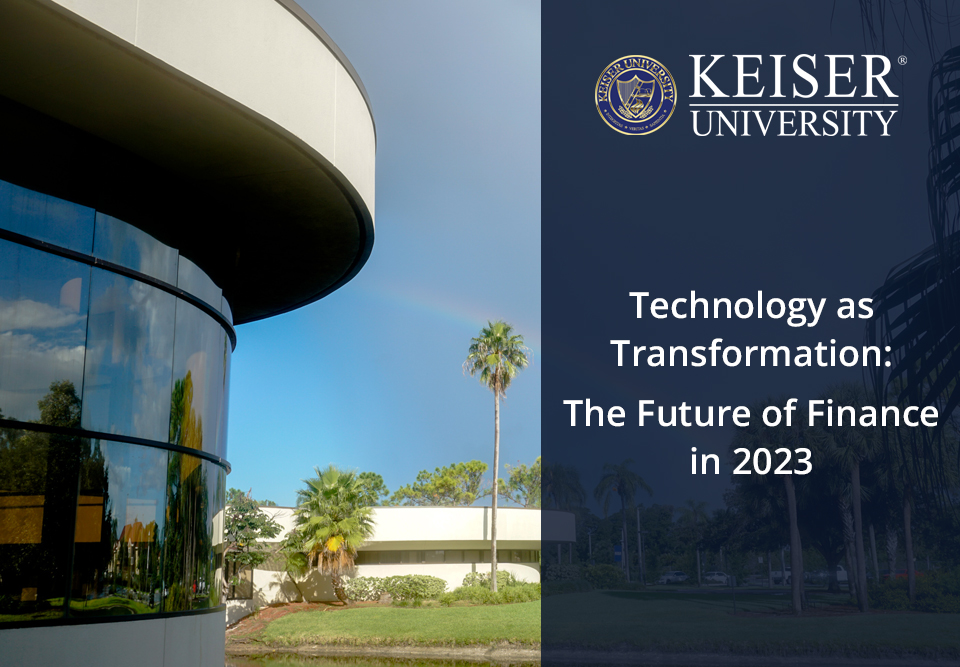The finance industry is facing a complex set of dynamics in 2023. Globally, concerns persist about the economy, with indicators unclear about whether a recession is on the horizon. In addition, inflationary pressures and workforce challenges continue to persist, affecting consumer wallets and corporate spending habits.
Rising interest rates, challenging and persistent supply chain issues and growing political tensions across the world, have destabilized some markets, and added to global finance uncertainty.
That said, there are important optimistic trends to watch in 2023. Technology continues to reinvent the way people engage with financial institutions and services providers. Fintech is likely to continue playing an outsized role, driving digital transformation in an industry that has been slow to adapt to innovative technologies.
Data, analytics, automation, and artificial intelligence will drive more insights and change how financial companies operate. With more and deeper insights on customers, banks, credit unions and financial services companies are likely to look for new revenue opportunities, better customer service and deeper customer relationships.
How will finance change in the future? That is a hard question to answer, but it is a good bet that technology will play a vital role. Here is a closer look at the future of finance, especially as it relates to fintech such as blockchain, cryptocurrencies and other technologies prime for disruption.
The Future of Finance
Consider the industries that have faced massive disruption due to digital transformation. The travel industry, for example, has been forever changed by the advent of apps like Airbnb and Uber. The future of finance is likely to also be shaped by technological advances. Here is a closer look at three core technologies that are likely to change finance.
Blockchain Technology in the Future of Finance
Blockchain technology has moved beyond crypto with varied applications in multiple sectors. Blockchain offers instant and immutable transactions and a powerful way to reduce fraud and theft. Its benefits are considerable, including:
- Security. Blockchain reduces the need for intermediaries such as transfer agents and single points of transactional failure. By design, its code is considered tamper-proof, protecting against both fraud and malicious attacks.
- Trust. With transparency in the digitally generated transactional ledger, all parties can see, interpret, use, and manage data, making agreements clearer and easier to reach.
- Transparency. Standard protocols and processes, shared across all parties, provide a sole source of truth for all participants in a transaction.
- Privacy. Data privacy is integral to every step of the transaction process.
- Scalability. As transaction volume grows, blockchain is built to scale, allowing for rapid growth for financial institutions that invest in it.
Blockchain has extraordinary application capabilities in finance. One of the most significant is the use of smart contracts. These contracts are like physical contracts except that blockchain allows contract terms to be executed in real time. That reduces intermediaries, improves security, and provides for the faster execution of contracts once terms are met.
Here are some of the other ways blockchain is changing finance:
- Streamlined banking and lending with real-time document verification and authentication
- Faster issuance of contracts and settlement time
- Disruption from smaller startups able to compete quickly with larger, more established institutions
- Banking alternatives without the restrictions, such as minimum balances or banking fees, that make it difficult for some to access financial services
- For capital markets, easier sales, and trading, along with asset-servicing post-trade services and simpler issuance
- Asset management functionality, including simplified fund launch, cap table management and fund administration
- More secure domestic retail payments and cross-border payments
- More accuracy in credit prediction and scoring
- Improved loan underwriting, syndication, and disbursements
There are some risks that come with using blockchain. As a new set of technologies, the security vulnerabilities are still unknown, despite industry claims and confidence in their security. If there are vulnerabilities that hackers learn how to exploit, they could divert funds transactions to other accounts and steal sensitive data.
Regulation is another area of the unknown. Blockchain is highly decentralized, placing it outside the purview of most government regulatory agencies. This lack of regulation can be a deterrent to businesses that may be interested in using the technology.
Scalability, while considered a strength, still has some issues that need to be worked out. As transaction volume increases, networks can slow down, leading to inefficiency. Given consumer expectations today, scalability is a critical issue for blockchain developers to address for it to be fully successful.
Cryptocurrencies in the Future of Finance
Crypto had a rough year in 2022. The instability of pricing, high-profile collapses of large companies and arrests and prosecutions led to wariness and worry about the future of crypto. Despite all that concern, a late 2022 poll showed that 53 percent of Americans across political party lines believe that crypto is the future of finance.
There is a growing familiarity with cryptocurrency and a desire for more regulatory controls over the currency, according to the survey results. Respondents believed that crypto represents a path towards more equity in the finance system and are looking for alternatives to the traditional financial systems. They believe that less of a reliance on banks and other financial institutions can drive equity.
That sentiment may be alarming to those who lead traditional financial institutions. But those who adopt and respond positively to crypto are likely to be ahead of the curve.
From a global perspective, the notion of crypto as the future of money is wildly unpredictable. In some countries, such as the Central African Republic and El Salvador, crypto is an official currency. By contrast, crypto transactions are illegal in China, one of the world’s most predominant economies.
The International Money Fund, in a late 2022 article, notes that digital money is likely here to stay. The potential benefits, especially to those living in developing countries, are just too great.
One challenge, as seen in 2022, is the wild volatility that is an unfortunate hallmark of crypto. Elevated levels of speculation and allegations of price inflation mean that coins like Bitcoin have little true economic value for now. Even stablecoins, which were developed to provide a hedge against volatility, proved unreliable in 2022.
Regulation is key, the IMF (International Monetary Fund) article notes. However, the development of a regulatory framework has been slow, and there are varied theories, beliefs, and approaches. With different countries using different regulatory frameworks, challenges will persist. A global regulatory structure would provide stability, boost consumer confidence and spur innovation.
In 2023 and beyond, crypto is likely to rebound from a tumultuous 2022. Among the trends to watch for are:
- More countries adopting Bitcoin or another cryptocurrency as legal tender
- Growth of online exchanges that allow for traders and regular consumers to deal in digital currencies
- Increased regulation in the U.S. and elsewhere
- More adoption across the globe of crypto payments
Fintech Continues Playing a Prominent Role in the Future of Finance
Fintech, the integration of technology into financial services, has been a growing trend within the financial industry. Its growth and applications have many experts asking, “Is fintech the future of finance?”
Institutions are spending millions of dollars to advance product and service offerings, modernize outdated systems and respond to evolving customer needs.
Fintech allows banks, for example, to reach into market segments never before possible, allowing for easy and remote account creation. It allows for branches to be redefined, reducing the need for in-person staff. Interactive teller machines, with advanced features and available chatbots and live customer support, give customers more control and the ability to transact more business without the need to engage with a human staff member.
Those are just a few examples of the opportunities that finance faces in the future. Remember, the ATM and debit card were once revolutionary technologies. It remains to be seen what will be the future transformational tech that changes forever how the world manages and engages in finance.
Here are some of the technology trends experts predict will play a significant role in finance in 2023:
- Open Banking. By providing third parties with consumer data, banks and other institutions will glean major insights into behavior, needs, patterns, and opportunities. Financial institutions can use information learned to provide improved customer service, reach new audiences, and develop products and services that consumers want and need. Open banking will allow for:
- Account aggregation, letting organizations to see all accounts across institutions in a single view
- Customized product offerings based on consumer histories with transactions and activity
- More access to credit for customers with thin files
- Analytics and financial management tools that will show spending patterns and allow for better budgeting
- Rise in Artificial Intelligence and Machine Learning. AI (Artificial Intelligence) and ML are designed to infuse efficiency throughout an organization. Computing advances using these tools allow organizations to collect massive amounts of data, store, and sort it. They can analyze massive datasets in seconds, generating reports and analytics that allow for more informed, clearer decisions in real time and in the moment of need. For those organizations that invest in these tools, the time saved, insights available and opportunities to leverage data are extraordinary.
- Accelerated App Development. Increasingly, AI and ML are allowing organizations to develop, test and deploy applications faster. The move to “low-code” or “no-code” app development allows organizations to respond to data insights, consumer demands and competitors with tools that are valued, needed and commodity. These tools will also likely provide opportunities for personalized engagements with customers, reduce errors and place a higher value on financial data than ever seen before.
- Cybersecurity Ever Present. The increasing vulnerability of financial data due to more persistent and sophisticated cyberattacks is, for many institutions, an existential threat. The need for vigilant, evolving, and powerful deterrents is imperative. Cybersecurity will continue to play a significant role in how financial institutions invest in technology, train staff, and combat these threats. Financial institutions are particularly vulnerable to cyberattacks; the consequences of exposing login information, financial data and assets can be grave for those that fail to protect them.
- Cloud Embrace. Cloud technologies continue to be a smart investment, with limitless capacity to store data, deploy applications and run a business. Financial companies will face increasing pressure from customers and regulators to replace outdated, slow, and precariously secure legacy systems. Cloud-based systems create more operational agility, better customer experiences, more secure environments, and cost savings.
Build Your Future in Finance at Keiser University
According to the U.S. Bureau of Labor Statistics, the business and finance markets are expected to grow 7 percent from 2021 to 2031. The global financial services industry grew by 8.8 percent in 2023. Despite some of the economic issues in the world, it is an industry primed for continued and sustained expansion, particularly with innovative financial technologies leading the way.
If you are interested in building a future in finance, your education is a smart first choice. For example, at Keiser University, you can pursue a master’s of science degree in financial technology. A master’s in fintech from Keiser introduces you to new and emerging technologies that are transforming the finance industry. You will learn about cryptocurrency, artificial intelligence, blockchain, data visualization, data analytics and financial forecasting. Contact a Keiser graduate admissions counselor and prepare for the dynamically evolving world of finance!






 The instructors at Keiser University impacted my life. They believed in my ability to become a great graphic designer, regardless of how I felt about my skills. KU helped to prepare me for the real world and got me to where I am today.
The instructors at Keiser University impacted my life. They believed in my ability to become a great graphic designer, regardless of how I felt about my skills. KU helped to prepare me for the real world and got me to where I am today.
